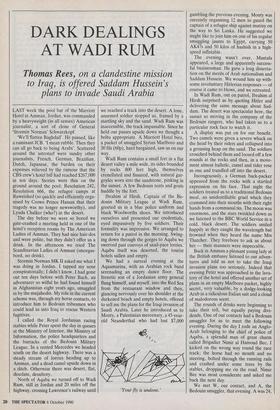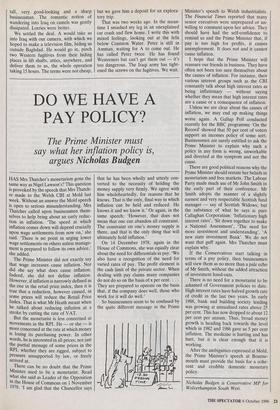DARK DEALINGS AT WADI RUM
Thomas Rees, on a clandestine mission
to Iraq, is offered Saddam Hussein's plans to invade Saudi Arabia
LAST week the pool bar of the Marriott Hotel in Amman, Jordan, was commanded by a heavyweight (in all senses) American journalist, a sort of clone of General `Stormin Norman' Schwarzkopf.
'We'll flatten Baghdad'. He paused, like a ruminant JCB. 'I mean rubble. Then they can all go back to being Arabs'. Scattered around the astroturf were sundry other journalists, French, German, Brazilian, Dutch, Japanese, the burden on their expenses relieved by the rumour that the CBS crew's hotel bill had reached $267,000 in ten days. Stories were thin on the ground around the pool: Resolution 242, Resolution 666, the refugee camps at Ruweished (so quickly and efficiently orga- nised by Crown Prince Hassan that their tragedy was no longer newsworthy), and Lynda Chalker (who?) in the desert.
The day before we were so bored we gate-crashed a meeting held in one of the hotel's reception rooms by The American Ladies of Amman. They had nice hair-dos and were polite, but they didn't offer us a drink. In the afternoon we tried The Scandinavian Ladies of Amman (smorgas- bord, no drink).
Stormin Norman MK II asked me what I was doing in Jordan. I tapped my nose conspiratorially; I didn't know. I had gone out ten days before with Peter Bach, an adventurer so wilful he had found himself in Afghanistan eight years ago, smuggled in by the mujahedin. My role in the current scheme was, through my horse contacts, to introduce him to Bedouin tribesmen who could lead us into Iraq to rescue Western fugitives.
I called the Royal Jordanian racing stables while Peter spent the day in queues at the Ministry of Interior, the Ministry of Information, the police headquarters and the barracks of the Bedouin Military League. In a rented Mercedes we headed south on the desert highway. There was a steady stream of lorries heading up to Amman, and a dead camel upside down in a ditch. Otherwise there was desert, flat, desolate, desultory.
North of Aqaba we turned off to Wadi Rum, still in Jordan and 20 miles off the highway, crossing Lawrence's railway until we reached a track into the desert. A lone, unarmed soldier stopped us, framed by a startling sky and the sand. Wadi Rum was inaccessible, the track impassable. Since he held our passes upside down we thought a bribe appropriate. A Marriott Hotel biro, a packet of smuggled Syrian Marlboro and 30 fils (60p), hard bargained, saw us on our way.
Wadi Rum contains a small fort in a flat desert valley a mile wide, its sides bounded by rocks 800 feet high, themselves crenellated and fissured, with natural gar- goyles worn into the sandstone, pinking in the sunset. A few Bedouin tents and goats huddle by the fort.
Ibrahim al Hirsh, Captain of the Be- douin Military League at Wadi Rum, greeted us in a blue police uniform and black Woolworths shoes. We introduced ourselves and presented our credentials, eyed impassively by five soldiers. Their formality was impressive. We arranged to return for a patrol in the morning. Swing- ing down through the gorges to Aqaba we swerved past convoys of snail-pace lorries. Aqaba itself was deserted, the tourist hotels sullen and empty.
We had a surreal evening at the Aquamarina, with an Arabian rock band serenading an empty dance floor. The frenetic son of a Jordanian army general flung himself, and myself, into the Red Sea from the restaurant window and then, glancing nervously over his shoulder at the darkened beach and empty hotels, offered to sell me the plans for the Iraqi invasion of Saudi Arabia. Later he introduced us to Monty, a Palestinian mercenary, a 45-year- old Neanderthal who had lost $7,000 'Your fly is undone.' gambling the previous evening. Monty was currently organising 12 men to guard the captain of a refugee ship against mutiny on the way to Sri Lanka. He suggested we might like to join him on one of his regular smuggling jaunts to Egypt, carrying 50 AK47s and 50 kilos of hashish in a high- speed inflatable.
The evening wasn't over. Mustafa appeared, a large and apparently success- ful businessman. He gave a long disserta- tion on the merits of Arab nationalism and Saddam Hussein. We wound him up with- some involuntary Hitlerian responses — of course it came to blows, and we retreated.
In Wadi Rum, out on patrol, Ibrahim al Hirsh surprised us by quoting Hitler and delivering the same message about Sad- dam. The desert was spectacular here, the sunset so moving in the company of the Bedouin rangers, who had taken us to a particular rock face to watch it.
A display was put on for our benefit. Two camels were given a severe whack on the head by their riders and collapsed into a groaning heap on the sand. The soldiers crouched behind them and loosed off a few Founds at the rocks and then, in a move- ment almost balletic, camel and rider rose as one and trundled off into the desert.
Incongruously, a German back-packer appeared from the rocks with a startled expression on his face. That night the soldiers treated us to a traditional Bedouin meal, an unidentifiable gruel which they crammed into their mouths with their right hands from a communal tin. The moon was enormous, and the stars twinkled down as we listened to the BBC World Service in a cold, black desert. The soldiers smiled happily as they caught the wavelength but frowned when they heard the name Mrs Thatcher. They forebore to ask us about her — their manners were impeccable.
Back in Amman a pleasant young lady at the British embassy listened to our adven- tures and told us not to take the Iraqi invasion plans too seriously. Indeed that evening Peter was approached in the lava- tory of the hotel and offered another set of plans in an empty Marlboro packet, highly secret, very valuable, by a dodgy-looking Arab in a ridiculous Italian suit and a cloud of malodorous scent.
The rounds of drinks were beginning to take their toll, but equally paying divi- dends. One of our contacts had a Bedouin smuggler for us to meet the following evening. During the day I rode an Anglo- Arab belonging to the chief of police of Aqaba, a splendid man of great charm called Brigadier Nimir al Hamoud Bec. I kicked on the wrong way round the race track; the horse had no mouth and no steering, bolted through the running rails and crashed under some trees by the stables, dropping me on the road. Nimir Bee was most considerate and asked me back the next day.
We met W, our contact, and A, the Bedouin smuggler, that evening. A was 24, tall, very good-looking and a sharp businessman. The romantic notion of wandering into Iraq on camels was gently dissipated. Lorries were better.
We settled the deal. A would take us into Iraq with our camera, with which we hoped to make a television film, hiding us outside Baghdad. He would go in, pinch two Western fugitives from their hiding places in lift shafts, attics, anywhere, and deliver them to us, the whole operation taking 15 hours. The terms were not cheap, but we gave him a deposit for an explora- tory trip.
That was two weeks ago. In the mean- time I smashed my leg in an unexplained car crash and flew home. I write this with mixed feelings, looking out at the fells below Coniston Water. Peter is still in Amman, waiting for A to come out. He has called Peter twice. He has found Westerners but can't get them out — it's too dangerous. The Iraqi army has tight- ened the screws on the fugitives. We wait.



















































 Previous page
Previous page